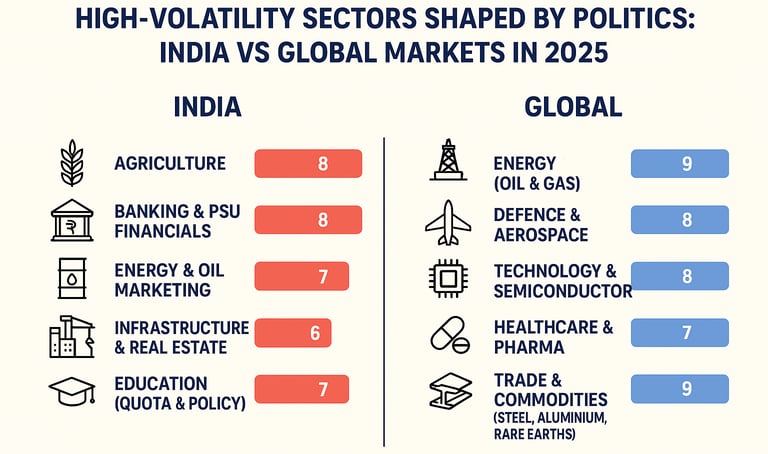High-Volatility Sectors Shaped by Politics: India vs Global Markets in 2025
Politics doesn’t just decide who governs—it directly influences markets. Some sectors are far more sensitive to political decisions, making them highly volatile for investors. In 2025, with elections, protests, and geopolitical tensions unfolding, understanding these politically sensitive industries can help investors protect and grow their portfolios.
RAVINDRA PRAJAPATI
9/1/20252 min read


🇮🇳 India: Most Politically Sensitive Sectors
1. Agriculture & Rural Economy
Why: Minimum Support Price (MSP) policies, farm loan waivers, subsidies, and farmer protests.
Impact: Fertilizer companies, tractor manufacturers, and rural demand-driven FMCG stocks swing wildly with each policy announcement.
2. Banking & PSU Financials
Why: Loan waivers, PSU recapitalization, and politically influenced credit schemes.
Impact: Public sector banks and NBFCs face Non-Performing Asset (NPA) risks when politics interferes with lending.
3. Energy & Oil Marketing
Why: Fuel price regulation, renewable energy subsidies, coal import rules.
Impact: Oil marketing companies (Indian Oil, HPCL, BPCL) often absorb losses to maintain voter-friendly fuel prices.
4. Infrastructure & Real Estate
Why: Election-driven infrastructure pushes, land acquisition laws, Smart City and metro rail projects.
Impact: Infra stocks rally pre-elections, but delays or policy reversals lead to sharp corrections.
5. Education & Reservation Policies
Why: Reservation debates (e.g., Maratha quota protests), NEP reforms, subsidies.
Impact: Universities, edtech firms, and private institutions face uncertainty whenever quota politics intensify.
Global: Politically Sensitive Sectors
1. Energy (Oil & Gas)
Why: OPEC+ decisions, sanctions on Russia/Iran, green energy policies.
Impact: Oil prices spike during conflicts or sanctions, hitting energy-importing economies.
2. Defence & Aerospace
Why: Wars, NATO spending, Indo-Pacific tensions.
Impact: Defence stocks surge during conflicts but cool down when peace talks begin.
3. Technology & Semiconductors
Why: US–China tech war, chip export bans, AI regulations.
Impact: Semiconductor and AI-driven companies rise or fall based on government restrictions or subsidies.
4. Healthcare & Pharma
Why: Drug price controls, vaccine policies, patent battles.
Impact: Pharma stocks are highly reactive to political announcements—COVID was a prime example.
5. Trade & Commodities (Steel, Aluminium, Rare Earths)
Why: Tariff wars, export bans, resource nationalism.
Impact: Commodity prices fluctuate sharply when trade restrictions are imposed or lifted.
Investor Takeaway
Short-term investors should watch policy moves closely—political shocks can trigger quick rallies or crashes.
Long-term investors may benefit by identifying sectors with government backing (e.g., renewable energy, defence).
Diversification across less politically sensitive sectors (like IT services or global ETFs) can help reduce risks.
In 2025, politics remains a powerful market driver. For investors, the challenge is to separate noise from opportunity and position wisely in a landscape where policies shape profits.
RAVINDRA PRAJAPATI, Not a sebi registered
FOLLOW Us
ravindra.prajapati1122@gmail.com
+91 9795187745
© 2025. PiPiFinTech All rights reserved.
Contact Us
ABOUT Us
Our mission is to empower you to maximize every single penny and best solution for wealth generation and management for every mature age group.
Product TOPICS
Digital E-Wealth Platform
Mutual Funds
Education Planning
Insurance
FD and Bonds
Retirement Planning
Wealth Creation
(Disclaimers : Mutual Fund investments are subject to market risks, please read scheme related documents carefully.)
